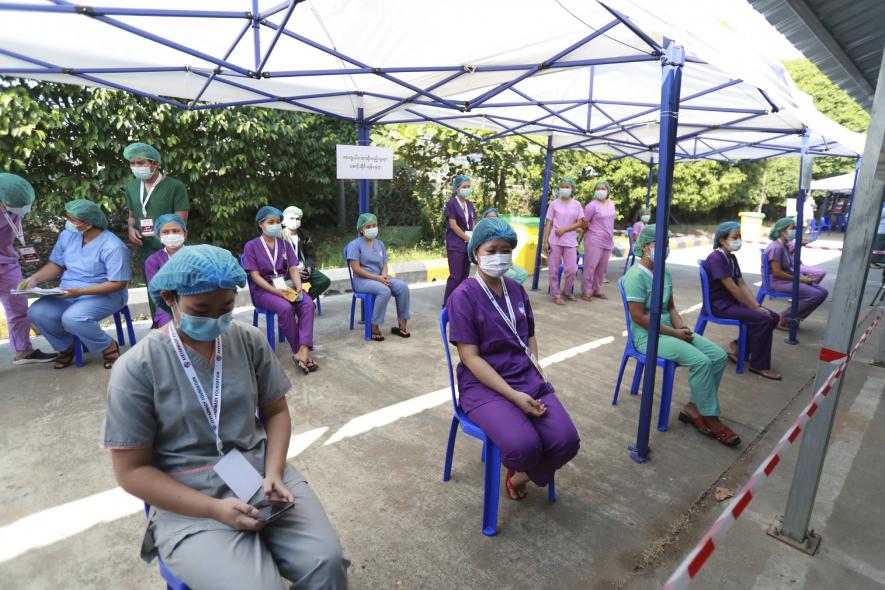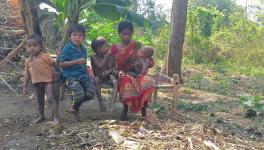Health Workers Start Anti-coup Protests in Virus-Hit Myanmar

Image Courtesy: AP
Jakarta: Medical workers across Myanmar began a civil disobedience protest against Monday's coup, wearing red ribbons and declaring they won't work for the new military government.
The army takeover that ousted the civilian government of Aung San Suu Kyi over allegations of fraud in November's elections could not have come at a worse time for a country battling a steady rise in COVID-19 cases with a dangerously inadequate health system.
"We want to show the world we are totally against military dictatorship and we want our elected government and leader back," said Dr Zun Ei Phyu, who lives in Yangon, the biggest city and commercial capital. "We want to show them we will follow only our elected government. Not the military."
Health workers in government hospitals and facilities issued a statement Wednesday opposing the coup. Photos were shared on social media showing workers with red ribbons pinned to their clothes or holding printed photos of red ribbons. Others used a three-finger salute that has become a symbol of pro-democracy protests in neighbouring Thailand, where a former general has led the government since a 2014 coup.
Some medical staff went on strike while others who continued work in government-run clinics made public their opposition to the new military rulers.
Some of those on strike have begun to volunteer at charity health clinics, many of which were shut down as a precaution against a surge in COVID-19 cases. The clinics that have remained re-open are extending their working hours so people can still receive care during the protest, Zun Ei Phyu said.
"We give free treatment and medicine to anyone who is in need," she said, adding the clinics often operate with donations from charities and local communities.
Myanmar's early response to the pandemic mirrored that of many countries: borders were nearly completely closed, lengthy quarantines were imposed on travellers and daily life slowed with stay-at-home orders.
It seemed to work until early September, when cases exploded from less than 1,000 to some 14,300 a month later. Now with more than 140,600 confirmed cases and 3,100 deaths, Myanmar's fragile health system faces the perfect storm of the pandemic and the coup.
"You could expect the military to take full advantage of COVID-19 as a political opportunity, not as a healthcare responsibility to the people of Myanmar," said Ronan Lee, a visiting scholar at the Queen Mary University of London's International State Crime Initiative.
History shows those concerns are not without merit.
In 2000, decades after the former military junta took control, the World Health Organisation (WHO) ranked Myanmar's health system as one of the worst. According to the World Bank, Myanmar's health expenditure was around 1.87% of its GDP in 2010, the year before democratic reforms began.
In March 2020, Myanmar reported just 0.71 intensive care unit beds and 0.46 ventilators per 100,000 population, which was insufficient to deal with even a moderate outbreak, according to data from the World Bank and WHO.
Donations of medical equipment have since arrived and the government has increased bed capacity with new quarantine centres, clinics and hospitals. But experts cite a lack of medical staff as a continuing problem.
Myanmar's small healthcare force had just 6.7 physicians per 10,000 people in 2018, significantly lower than the global average of 15.6 in 2017.
The coup comes just days after Myanmar launched its vaccination campaign with some 15 lakh doses of a two-shot vaccine donated by India.
The military has its own medical corps and medical facilities across the country. But Sharon Bell, a researcher who previously studied the health system in Myanmar, said she does not anticipate the military will have the ability to control outbreaks or conduct sufficient vaccination programmes.
The military released a statement saying "prevention of the current outbreak of the COVID-19 pandemic will be efficiently carried out with momentum".
According to Lee, when the military talks about getting the virus under control, it means "locking down the community and preventing opportunities for public expressions of opposition to their rule".
"I expect they will use the pandemic as a shield to defend them from scrutiny," he said.
Get the latest reports & analysis with people's perspective on Protests, movements & deep analytical videos, discussions of the current affairs in your Telegram app. Subscribe to NewsClick's Telegram channel & get Real-Time updates on stories, as they get published on our website.
























